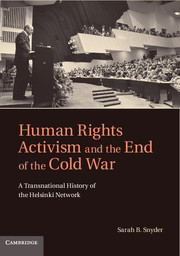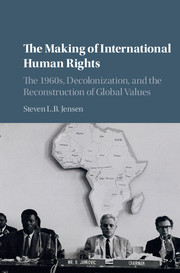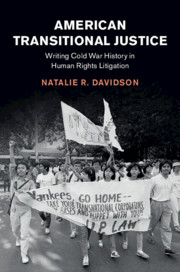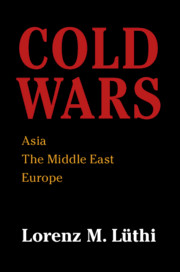Human Rights Activism and the End of the Cold War
Two of the most pressing questions facing international historians today are how and why the Cold War ended. Human Rights Activism and the End of the Cold War explores how, in the aftermath of the signing of the Helsinki Final Act in 1975, a transnational network of activists committed to human rights in the Soviet Union and Eastern Europe made the topic a central element in East-West diplomacy. As a result, human rights eventually became an important element of Cold War diplomacy and a central component of détente. Sarah B. Snyder demonstrates how this network influenced both Western and Eastern governments to pursue policies that fostered the rise of organized dissent in Eastern Europe, freedom of movement for East Germans and improved human rights practices in the Soviet Union - all factors in the end of the Cold War.
- Highlights the role of human rights activism in the end of the Cold War
- Demonstrates the existence and influence of a transnational network devoted to the implementation of the Helsinki Final Act
- Revises existing accounts of the late Cold War
Reviews & endorsements
'… innovative conceptually and methodologically and makes an extremely important contribution to the study of international affairs during the 1970s and 1980s, including the ending of the Cold War.' Akira Iriye, Harvard University
'An important and engaging contribution to the growing literature on 'the Helsinki effect' - how non-binding agreements may in effect punch above their weight by effecting powerful changes to the contours of international politics.' Elizabeth Borgwardt, author of A New Deal for the World: America's Vision for Human Rights, 1941–1946
'… Sarah Snyder's well-researched study demonstrates the role played by the Helsinki Final Act in bringing democracy and respect for human rights to Eastern Europe.' International Affairs
Product details
May 2011Adobe eBook Reader
9781139065542
0 pages
0kg
10 b/w illus.
This ISBN is for an eBook version which is distributed on our behalf by a third party.
Table of Contents
- Introduction
- 1. Bridging the East-West divide: the Helsinki Final Act negotiations
- 2. 'A sort of lifeline': the Helsinki Commission
- 3. Even in a Yakutian village: Helsinki monitoring in Moscow and beyond
- 4. Follow-up at Belgrade: the United States transforms the Helsinki process
- 5. Helsinki watch, the IHF, and the transnational campaign for human rights in Eastern Europe
- 6. Human rights in East-West diplomacy
- 7. 'A debate in the fox den about raising chickens': the Moscow conference proposal
- 8. 'Perhaps without you, our revolution would not be'
- Conclusion.





